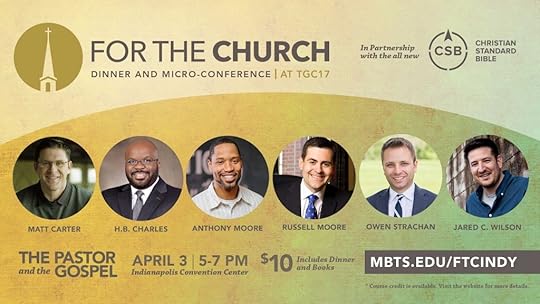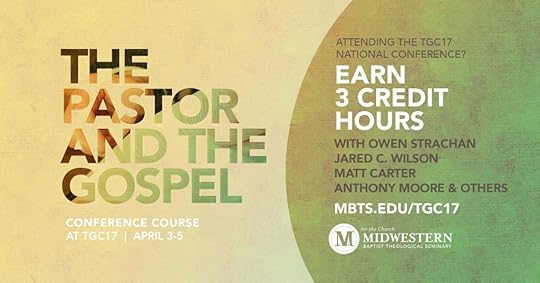Jared C. Wilson's Blog, page 23
January 19, 2017
A Literary Journey into God’s Love
 I am devoting most of my non-fiction reading in 2017 to the subject of God’s love and its implications. It is something my heart has been hungry for lately, at least more consciously so. We’re all in desperate need of experiencing the love of God every millisecond of our lives, of course, even if we don’t feel we are. But as I thought about how I wanted to add some direction to some of my 2017 studies, I couldn’t think of a more spiritually edifying and personally necessary subject than the love that 1 John 4:8 says God himself is.
I am devoting most of my non-fiction reading in 2017 to the subject of God’s love and its implications. It is something my heart has been hungry for lately, at least more consciously so. We’re all in desperate need of experiencing the love of God every millisecond of our lives, of course, even if we don’t feel we are. But as I thought about how I wanted to add some direction to some of my 2017 studies, I couldn’t think of a more spiritually edifying and personally necessary subject than the love that 1 John 4:8 says God himself is.
I’ve broken the titles down into mainly three categories: devotional, theological, inspirational/practical (“Christian living”). There is some overlap, obviously, and I didn’t have an equal number in each category, but that’s generally how I’m going about the list.
I assume only a few of my readers may be interested in this, but here is the list I’m starting out with, in the order I plan to read them:
All Loves Excelling by John Bunyan (devotional)
The Love of God: A Canonical Model by John Peckham (theological)
A Loving Life: In a World of Broken Relationships by Paul Miller (inspirational)
Charity and Its Fruits by Jonathan Edwards (devotional)
Testaments of Love by Leon Morris (theological)
God’s Love by R. C. Sproul (inspirational)
Life of the Beloved by Henri Nouwen (devotional)
You Are What You Love by James K. A. Smith (theological)
His Love Endures Forever by Garry Williams (inspirational)
The Love of God by Oswald Chambers (devotional)
Nothing Greater, Nothing Better: Theological Essays on the Love of God edited by Kevin Vanhoozer (theological)
The God Who Loves You by Peter Kreeft (inspirational)
The Love of Christ by Richard Sibbes (devotional)
The Difficult Doctrine of the Love of God by D. A. Carson* (theological)
Love in Hard Places by D. A. Carson* (theological)
A Different Kind of Happiness: Discovering the Joy That Comes from Sacrificial Love by Larry Crabb (inspirational)
Heaven: A World of Love by Jonathan Edwards* (devotional)
Works of Love by Soren Kierkegaard* (theological)
Leading with Love by Alexander Strauch (inspirational)
God Loves You by Charles Spurgeon (devotional)
The Four Loves by C.S. Lewis (theological)
The God Who Loves by John MacArthur (inspirational)
In addition, I’ll be reading all along the way Gerald Bray’s systematic theology, God Is Love.
My prayer through this expedition is that God may grant me to be further strengthened with power through his Spirit in my inner being, so that Christ may dwell more richly in my heart and that I may be more greatly strengthened to comprehend with all the saints what is the breadth and length and height and depth, and to know the love of Christ that surpasses knowledge, that I might be filled with all the fullness of God (Eph. 3:16-19).
Anything you think I’m missing and should add to the list?
* Denotes books I have read before and will be revisiting.
January 18, 2017
The Normal Pastor Conference, August 7-8
Ever feel like the average pastors’ conference wasn’t quite for you? Wish the average pastors’ conference spoke to the pastors who were a little more . . . well, average? We’re introducing The Normal Pastor Conference for any church leader who may feel a little discouraged in ministry, maybe a little outside the scope of the common church growth wisdom or a little left out when it comes to the ever-changing trends in church resources.
This isn’t about big churches or small churches or big platforms or small platforms. Whatever your ministry context or scale, The Normal Pastor is for any minister who is a little more convinced each day that he needs a lot more gospel and a lot less of himself. If you long less for building a ministry empire and more for leaving a legacy of simple faithfulness to the local church, we think that’s normal. And this conference is for you.
Join me, Zack Eswine, Erik Raymond, and Joe Thorn in Orlando, FL on August 7-8. Conference cost is just $50, and we hope to keep it that way. You can help by registering today!
More details to come.
Sponsored by The CSB.
January 17, 2017
What to Do (and What Not to Do) When Your Pastor Moves On
 I heard from another pastor recently whose exit from his church went sideways. He and his wife believed the Lord had called them to step down from their current position and serve in another location, and after several years of (by all accounts) successful ministry, he believed he was resigning on good terms. He knew his news would be a surprise to his congregation, but he was not prepared for the depth of hurt feelings and anger his departure would stir up. And what should have been a bittersweet parting of ways turned into a sad limping away.
I heard from another pastor recently whose exit from his church went sideways. He and his wife believed the Lord had called them to step down from their current position and serve in another location, and after several years of (by all accounts) successful ministry, he believed he was resigning on good terms. He knew his news would be a surprise to his congregation, but he was not prepared for the depth of hurt feelings and anger his departure would stir up. And what should have been a bittersweet parting of ways turned into a sad limping away.
His story isn’t rare. And it’s quite a fascinating—if depressing—phenomenon. I’ve heard from more than a few ministers who’ve resigned on good terms—no moral failings, no being forced out, no ethical impropriety, no significant ministerial failure or exacerbating conflict in the church—and yet found themselves surprised and hurt by their congregation’s handling of their exit. We sometimes expect pastors leaving under bad terms to leave a bad taste in the church’s mouth, but we don’t really think about what can go wrong when an otherwise good pastor leaves under otherwise good circumstances.
If you’ve got a good pastor, now is the time to think about this. He may not leave any time soon (or ever!), but preparing your heart now for a statistically common reality can help prevent plenty of heartaches in the future—for you and for them. Here are some things the church ought to do if and when their pastor resigns under good circumstances:
1. Love his family well.
Some of the worst treatment I’ve heard of hasn’t necessarily been toward a departing pastor but toward the departing pastor’s wife. Please remember that throughout his ministry, she has often carried more weight than you’re aware of. She knows of his ministry struggles but also his personal pains and heartaches. Transitions like these are rarely easy on families—wrestling through decisions, fear of uprooting, fear of hurting people’s feelings, the nervousness of stepping out in faith, stress of preparations for the actual moving.
Some churches “make it easy” on pastor’s families in the wrong way! They make the next destination seem more welcome than it previously did purely by souring on the pastor and his family. Some ministry wives in the midst of transition suffer the silent treatment from friends or other church folks, or even gossip or slander. Realize that the pastor’s family is probably sad to leave too but doing their best to follow God’s call. Speak kindly to his wife, ask how you can help her, “talk her up” to others in the congregation, or otherwise pray for her cheer and success in the days ahead. Be encouraging to their children and ask them questions about what they’re looking forward to in the move. They may not officially be your pastoral family any more, but don’t abandon them or treat them like damaged goods.
2. Celebrate the successes you’ve enjoyed together.
A few pastors I’ve talked to who’ve left under good circumstances have endured going-away parties that felt more like funerals. What a miserable send-off that is to a brother in Christ who loved you well and served your church faithfully. If you’re throwing a party for him and his family, actually celebrate the ministry milestones you’ve witnessed together during his tenure.
One of the best send-offs I ever got was when I left one student ministry position to take another. On my last Wednesday night with the youth group I was departing, they sat me on a stool on the stage and held an “affirmation time.” What was great about that moment is that I was actually struggling with whether I’d made any kind of difference or accomplished anything in my short time in that position, but a few students I never would have expected stood up to mention a time I’d encouraged them or helped them get through particular struggles. One student in our youth group, a particularly sullen fellow, stood up to say that he felt like I was one of the only leaders who understood him. And all along I thought this kid in particular didn’t like me! I would have never known about that if the opportunity wasn’t given to share.
I know it’s sad to see a beloved pastor go, but you actually don’t serve him well if you mope around and treat him with passive-aggressive disapproval. Of course, you don’t want to seem too happy he’s leaving! But affirm that his time with you was not wasted, that his ministry made a difference in your life and the life of the church. If you can’t open up the floor for personal affirmations, have another leader or two recount some of the initiatives your pastor led that helped the church grow, have a few key leaders share stories of your pastor’s faithfulness, and so on.
My friend Ray once told me that pastors exiting a church on good terms ought to take a humble victory lap. How can you arrange that for your pastor friend?
3. Ask him to help you prepare for his successor.
No, if you can help it, he probably shouldn’t be on the search team! But think about it: nobody knows what it’s like to serve in that role like he does. Why not ask him to make a list for you of challenges and expectations particular to your church and your community? If he is indeed leaving under good circumstances, invite him to leave a letter for the next pastor encouraging him and giving him the “lay of the land,” similar to the way outgoing presidents leave notes for their successors.
Ask your pastor what particular strengths or gifts he feels he lacked and his successor should have that would make his tenure just as successful or more successful than his own. If you have a good pastor who is leaving, he still cares about your church and wants you to continue to grow and flourish in the gospel. Lean into that. Simply ignoring his counsel for your ensuing search process would be foolish.
4. Watch out for the control freaks.
In many churches there exists a person or two (or three or four or five . . . ) who really like to run things. If their interests haven’t aligned with your pastor’s, it is usually only the growth of the church and the success of his leadership that will keep them in check. (If he wasn’t leading well or the church wasn’t growing, they probably run things already.) But if your pastor has enjoyed a growing ministry, these folks tend to exist almost like a sleeper cell waiting for activation. When he resigns, they may see their opportunity to “get their church back.”
Look out for the gossips, the dividers, the nitpickers, the naysayers, the grumblers—basically all the kinds of negative people Paul and the other apostles warned their churches about_who will seek to fill the “power vacuum” they perceive left by your departing pastor. Remember that it doesn’t really take a majority of people to divide a church; you just need a motivated minority. And they will always confess good intentions, expressing quite sincerely they mean to get right what they say your pastor got wrong. But if the control freaks exploit your pastor’s resignation for their own need to steer the ship, you not only discourage your pastor, you also endanger your church after he’s gone.
5. Don’t write him off.
Don’t unfriend him on social media. Don’t refuse to speak to him again. Don’t act as if he no longer serves any use to you simply because he isn’t your pastor. If he had some positive effect on your spiritual walk, let him know! And pray for him. It is difficult to pray for a man and feel sinfully angry or disappointed in him at the same time. In a few months after his departure, reach out to ask how he and his family are doing. Keep him on your Christmas card list. Say “hey” on his birthday. Pray for his future ministry, that it would flourish and succeed too. Wish his new church well and pray for their joy in the Lord, as well as your own.
We’re all in this together, after all, and it is the kingdom that ultimately matters, over and above the increase or decline of any church or the coming and going of any pastor.
What’s Wrong With Creating a Worship Experience?

In his invaluable book The Divine Commodity, Skye Jethani reproduces a conversation between economist James Gilmore (author of The Experience Economy) and Leadership Journal staffers Marshall Shelley (MS), Eric Reed (ER), and Kevin Miller (KM) that gets to the problematic heart of some evangelical churches’ drive toward producing a “worship experience.” I excerpted it in The Prodigal Church, and thought it might be of interest to blog readers:
MS: So how does all this “experience providing” apply to the church?
Gilmore: It doesn’t. When the church gets into the business of staging experiences, that quickly becomes idolatry.
MS: I’m stunned. So you don’t encourage churches to use your elements of marketable experiences to create attractive experiences for their attenders?
Gilmore: No. The organized church should never try to stage a God experience.
KM: When people come to church, don’t they expect an experience of some kind? Consumers approach the worship service with the same mindset as they do a purchase.
Gilmore: Increasingly you find people talking about the worship experience rather than the worship service. That reflects what’s happening in the outside world. I’m dismayed to see churches abandon the means of grace that God ordains simply to conform to the patterns of the world.
KM: So what happens in church? Are people getting a service, because they’re helped to do something they couldn’t do on their own, that is, get closer to God? Or are they getting an experience, the encounter with God through worship?
Gilmore: The word “getting” is, I think, the problem with contemporary Christianity. God is the audience of worship. What you get is, quite frankly, irrelevant as a starting point.
ER: But people, especially unchurched people, don’t perceive it that way. They’re expecting some return.
Gilmore: They come that way at first: “Give me, feed me, make me feel good.” But they should be led to say, “Hey, this is not about me, God. Worship is to glorify you.”
KM: But if my mission is to reach a consumerist culture — if I’m going to get a hearing for my message — then I’m going to have to provide something that the consumer considers of value.
Gilmore: That is the argument. But the only thing of value the church has to offer is the gospel. I believe that one result of the emerging Experience Economy will be a longing for authenticity. To the extent that the church stages worldly experiences, it will lose its effectiveness.
– Skye Jethani, The Divine Commodity: Discovering a Faith Beyond Consumer Christianity (Grand Rapids, Michigan: Zondervan, 2009), 72-73.
January 10, 2017
Loving the People You Love to Hate
 In the midst of my umpteenth re-reading of C. S. Lewis’s classic Mere Christianity, I came across this passage and found it holding new resonance. Apply what Lewis is explicating below to any of the following:
In the midst of my umpteenth re-reading of C. S. Lewis’s classic Mere Christianity, I came across this passage and found it holding new resonance. Apply what Lewis is explicating below to any of the following:
Gossip
Church conflict
Relational jealousy
Sharing of news stories that confirms our suspicions about people on the other end of the political or cultural spectrum
The language that is used in clickbait links, soundbite videos, mocking memes, and exposé blog posts. We don’t say someone is “critiqued” or their ideas “debunked;” we say they were “destroyed,” “owned,” and so on. We use the language of humiliation or violence.
Here’s how you know if you hate something someone has done or if you actually hate that person.
The real test is this. Suppose one reads a story of filthy atrocities in the paper. Then suppose that something turns up suggesting that the story might not be quite true, or not quite so bad as it was made out. Is one’s first feeling, “Thank God, even they aren’t quite so bad as that,” or is it a feeling of disappointment, and even a determination to cling to the first story for the sheer pleasure of thinking your enemies as bad as possible? If it is the second then it is, I am afraid, the first step in a process which, if followed to the end, will make us into devils. You see, one is beginning to wish that black was a little blacker. If we give that wish its head, later on we shall wish to see grey as black, and then to see white itself as black. Finally, we shall insist on seeing everything—God and our friends and ourselves included—as bad, and not be able to stop doing it: we shall be fixed for ever in a universe of pure hatred.
How about you? Is your hatred fed by confirmation bias? Do you dismiss correction of your critique because the corrections don’t fit your narrative?
Do you love to hate somebody? Do you hope for their failure and inwardly delight when it comes? Do you have the slightest inkling that your desire for justice has bled into desire for vengeance?
And if so: do you find any of that commensurate with loving your neighbor?
Love bears all things, believes all things, hopes all things, endures all things.
— 1 Corinthians 13:7
Where I’ll Be, Spring 2017

For those who care about such things, I thought I’d share some of my upcoming speaking dates. If you’re in any of these areas and able to attend, would be great to meet you.
January 27-28 – Ready Conference. Kansas City, MO. I’ll be speaking at this student conference hosted at Midwestern Seminary along with Trip Lee, Owen Strachan, and John Mark Yeats.
February 3-5 – Salt Company Spring Conference. Des Moines, IA. Really excited to be the speaker at this event for the booming college campus ministry connected to Cornerstone Church.
February 9-10 – RightNow Media Conference. Orlando, FL. Join me, Eric Mason, Larry Osborne, and more for this promising event.
March 7-9 – Lancaster Bible College. Lancaster, PA. This will be my fifth year preaching a week of chapel services at LBC. Love these folks!
April 3 – The Pastor and The Gospel. Indianapolis, IN. Join me, Matt Carter, H.B. Charles, Anthony Moore, Russell Moore, and Owen Strachan for this For The Church pre-conference dinner event at the The Gospel Coalition. Just $10 gets you dinner and some cool talks.
April 2-5 – The Gospel Coalition National Conference. Indianapolis, IN. I’ll be delivering a breakout session titled “Why the Gospel’s Exclusivity is Compelling” during Round 3 of workshops on April 4.
My full speaking calendar is available here. And if you’re interested in having me speak or preach at your church or event, inquiries may be sent via this page.
January 9, 2017
For the Pastor with a Bad Case of ‘The Mondays’
 On the last day of the feast, the great day, Jesus stood up and cried out, “If anyone thirsts, let him come to me and drink.”
On the last day of the feast, the great day, Jesus stood up and cried out, “If anyone thirsts, let him come to me and drink.”
— John 7:37
Monday. What to do with these Mondays of ours?
If you’re a pastor or ministry leader, I know that Mondays for you can be a mixed bag. You may be still glowing from yesterday’s victories—high attendance, vibrant worship, the well-preached sermon and ensuing compliments. Or you might be still smarting from yesterday’s wounds—struggling ministry, sluggish praise, the feeling of not quite delivering that hoped-for homiletical fire. Maybe you’ve heard one complaint too many, too much grumbling. The loyal opposition continues to gossip and nitpick. Maybe your wife or kids are unhappy. Maybe you don’t know how to ask the church’s “powers that be” to help you afford to pay your bills. Or maybe you’re just in a funk, feeling like you’re spinning your wheels and not sure why what you’re doing matters.
Pastors, there is hope for you. The Lord of our God is unrelentingly for you. His affection for you and his approval of you are in no way contingent on you “hitting one out of the park.” His thoughts about you are not shaped by your ministry achievements or lack thereof. He has not gathered his Trinitarian self into the heavenly war room to troubleshoot you.
No, God is not a fan of yours. He’s not a fan of yours, because fans are fickle and turn on you when they get disappointed. Fans tie their feelings to performance. God is not a fan. He’s a friend. You can’t disappoint him, because you can’t surprise him. He sees your bad sermons coming. He has numbered all your days, including your days of feeling a little “off,” before the foundation of the world. He is not put off by your critics, and he is not puffed up by your yes-men. He is the great I AM: he is that he is. And he approves of you eternally by the blood of Christ applied to the doorpost of your heart—and to the doorpost of your ministry.
So there is water for you today, whether you push through on these difficult Mondays in the quiet of your study or the busyness of the visitation route or whether you take these Mondays off to recuperate at home. There is water for you at every moment, living water flowing freely from the pierced bosom of Christ. It is water to satisfy your thirsty soul, water to heal your ministry wounds, water to cool your heels, water to cheer your “Monday face.” Don’t look for it anywhere but in Jesus.
Monday. What a great day to come tired and burdened to Jesus and let him help you.
January 3, 2017
Looking for Love in La La Land
 My eldest teenage daughter really did not like the end of La La Land. We went as a family last night to catch the new musical from Damien Chazelle starring Emma Stone and Ryan Gosling and the ending left her not a little disappointed. Spoilers to follow.
My eldest teenage daughter really did not like the end of La La Land. We went as a family last night to catch the new musical from Damien Chazelle starring Emma Stone and Ryan Gosling and the ending left her not a little disappointed. Spoilers to follow.
The first thing I should say about the movie is that it is a wonderful throwback to the Hollywood musicals of yesteryear, from its cheeky “Presented in Cinemascope” opening to its classic “The End” and all the colorful whimsy along the way. The songs are clever and poignant, the dance scenes range from fun to enthralling, and the whole thing just oozes romance and charm. It’s a beautiful film in more ways than one. I loved it.
But that ending. I was somewhat prepared for it, because about one-third of the way into the film, I recognized that La La Land owes a lot to a 1964 French musical, a personal favorite of mine, The Umbrellas of Cherbourg, which has since become a classic. Not only does La La Land borrow much of its aesthetic from Umbrellas — the color pallette seems directly lifted — but the storyline was pretty similar too.
In The Umbrellas of Cherbourg, Guy and Genevieve fall in love as poor, dreamy youths, but end up separated by the Algerian war, when Guy is conscripted into service. The distance puts a strain on their relationship and eventually Genevieve, though pregnant with Guy’s child, marries a rich jeweler. (I’m selling the plot short here, just for space’s sake.) The movie is lush and romantic and yet bittersweet, right down its heart-wrenching end when Guy, working at the American-style petrol station he has built from the ground up winds up serving a now well-to-do, married Genevieve when she pulls up in her fancy car, their daughter in the backseat. They share a moment of “what might have been.” Genevieve asks if he wants to meet their daughter. He declines. Perhaps it’s too painful? The film closes with Guy going home to his own wife, giving her a gentle kiss, and playing with his son in the snow.
Anyone who’s seen La La Land will notice the similarity when, after 5 years of separation pursuing her dreams, Mia winds up (by happenstance?) with her husband at her old love Seb’s jazz club. Director Chazelle deftly depicts a fantasy sequence in which we see a quick alternative history of Mia and Seb’s would-be life together before returning us to reality, Mia and Seb sharing a knowing glance and a smile before she follows her husband out the door and the movie ends. That was when my 15 year old daughter said, not quietly, in a crowded theater, “No.”
It was not the desired payoff to Mia and Seb’s romantic journey. She wanted — and let’s be honest, we want — our happily ever after. But how do we know Mia and Seb aren’t happy? Can’t you appreciate the old longings of youthful romance while being perfectly content with the mature joys of lives well-lived?
I came home and read my friend Steve Bezner’s take on the film. He felt the film copped out by pitting romance against reality:
The song ends. Seb is emotionally spent. Mia exits. But, at the end, they exchange one last look and friendly nod. They mutually agree: We made the right decision. We chose our dreams instead of love.And this is why I hated La La Land.
Steve expounds:
In logic class a teacher would call this forced decision between dreams and love a false dichotomy. That is, we are led to believe that there is only one possible path. Either Mia and Sebastian choose one another, or they choose the passionate thing in their lives.Writer-director Damien Chazelle may believe the choice to be so clear. To be sure, when we choose love, we choose the pace and the terms of our dreams. And when we pursue our dreams, we find that love may not be as convenient as we would wish. But Chazelle makes a grave error: He leads us to believe that we must choose, that we cannot be so bold as to choose both . . . In the end, Chazelle most likely told his story through La La Land. I wish, however, he would have told a better story. If Mia’s character is truly singing the truth, then there is not only one choice: love or dreams.
And that, I suppose, is why I ended up hating La La Land. The visionary Chazelle moved me to transcendence believing in the fools who dream, yet, ultimately, he was not able to dream of something larger. Wouldn’t the largest, grandest dream of all be capable of something more noble? In my mind, if Mia and Sebastian would have chosen to embrace the love so clearly portrayed in the film, they could have each pursued their dreams — just differently. Perhaps they would not be able to do so with the same obsessive abandon, and perhaps there would be sacrifices along the way. But they would have learned something much better than the satisfaction of attaining goals — the true nature of love has very little to do with getting exactly what you want.
In the end, La La Land couldn’t dream big enough because it did not understand that the true nature of love is not simply the pursuit of what I want. Love is, instead, about mutual sacrifice.
Steve is exactly right about love. And he’s right that this musical doesn’t quite get the nature of true love — that is to say, love with the sacrifice of Christ embedded in it, motivating it, fueling it to endure all things, bear all things, hope all things, et cetera. And yet, I read the film differently and I think there are some signs of real love even in that ending.
I read it differently because Seb encouraged Mia to go to that audition and take that movie in Paris, knowing it could jeopardize their relationship in the same way his going on the road with that terrible John Legend band did. But he loved her enough to sacrifice being with her so she could chase her dream she had worked so hard for. He didn’t want to selfishly keep her. He loved her happiness more than his own.
Maybe I’m reading too much into it, but I’m also factoring in that Seb was willing to sacrifice his own dream to take that steady gig with the ridiculous John Legend band because he thought that’s what Mia wanted. It was a sacrifice and he never complained about it, really, until they had that argument at the reunion dinner. He was very much a jerk in that moment and said some thoughtless, hurtful things, but with a bit of charity we can see that he felt hurt she didn’t recognize he had given up his dream to be able to provide for hers.
So when he ends up telling her to go to Paris, it’s still him willing to give up what he wants for her. He may be thinking wrongly about this, but he isn’t thinking selfishly. And at first I’m sure they thought “it’s just 3 months,” “we’ll get back together,” or whatever, but everyone knows that kind of distance can affect a dating couple.
In the end, I felt very similarly to my daughter. It’s how I felt at the end of The Wonder Years when I found out Kevin didn’t end up with Winnie. I felt betrayed. It’s a movie! We want the lovers to end up together. But I think all of us who’ve put some time in to adult life remember young love and the dreams and passions of youth and have learned to be content and not to get frustrated about “what could’ve been” but to find joy wherever the Lord has led us and think it was sweet in its season.
I’m also thinking that Mia’s husband — who we know really nothing about but end up hating basically because he’s not Ryan Gosling! — must be a really awesome guy, actually, if he landed a gal like Mia. And she can always be grateful that Seb loved her enough not to try to control her. From all indications, she ended up with a pretty great life, it seems. And Seb did too.
In the end, La La Land pays extraordinary tribute to one of God’s greatest gifts — romance. And, of course, another: youth. But what La La Land and Umbrellas of Cherbourg share is a besetting realism — if you can call it that. Perhaps cynicism is a better word. But I like realism, because they both capture the delirium and ecstasy of romance — even the fact that both are musicals, tuned to the melodies of the love-besotted heart, points to this — while at the same time putting this experience in the context of real life, where feelings of romance and the pursuit of youthful imaginations come and go, wax and wane. I think, in fact, that this realism makes La La Land more beautiful, not less.
The only thing that makes it less realistic, besides them constantly breaking into song, is the notion they hadn’t looked up their old flame on Facebook like so many age-weary adults are prone to do today. Maybe it’s because they’ve grown up? Become happy with their respective lives and loves?
The title is an interesting one. “La La Land” is a well-known moniker for Los Angeles, where the film is set and which accurately captures the fantasy world of Hollywood. It’s also a reference to the music in the movie (la la la). But it’s also a phrase referring to craziness, right?, to make believe. We say things like, “That guy lives in la la land.” We use it to refer to people who aren’t in their right minds or whose abilities don’t match their imaginations. I wonder if this is something else Damien Chazelle is telling us: romance is beautiful and wonderful and grand and exciting, but anyone who thinks it is the end-all, be-all is — you guessed it — living in la la land.
He has made everything beautiful in its time . . .
— Ecclesiastes 3:11
December 21, 2016
My Top 10 Posts for 2016
 Below are the most-read posts from The Gospel-Driven Church over the last year. Thanks, all, for taking time out of your schedule to read and often respond to my work. I am grateful to God for you.
Below are the most-read posts from The Gospel-Driven Church over the last year. Thanks, all, for taking time out of your schedule to read and often respond to my work. I am grateful to God for you.
Beginning with the most-read post . . .
1. Top 10 things I Wish Worship Leaders Would Stop Saying
2. Top 10 things I love that Worship Leaders Do
3. Politics Ought #NeverTrump Principle
4. 5 Reasons You Should (Probably) Leave Your Attractional Church
5. The Attractional Church’s Growing Irrelevance
6. 5 Distinguishing Marks of a Fruitful Church
7. 10 Things Young Singles in Romantic Relationships Ought to Know
8. Shall We Endorse Evil That Good May Result?
9. 3 Nagging Problems with Andy Stanley’s Approach to the Bible
December 16, 2016
Earn Seminary Credit at TGC17 with ‘The Pastor and the Gospel’
Attending TGC17 in Indianapolis this coming April? You can earn three hours of seminary credit taking Midwestern’s special course, “The Pastor and the Gospel,” featuring exclusive teaching content from Dr. Owen Strachan and myself, and culminating in a pre-conference dinner event with talks from us, The Austin Stone’s Matt Carter, The Village Church’s Anthony Moore, and more.
Course requirements, application form, and more details at mbts.edu/tgc17
For further information, please contact the Center for Public Theology at cpt@mbts.edu.





